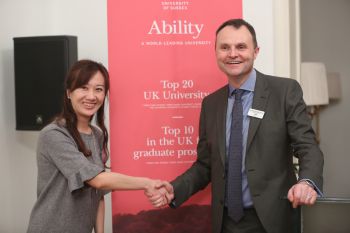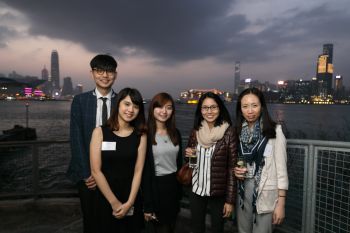Graduation, alumni receptions and trade policy talks take place during China visit
By: Tom Furnival-Adams
Last updated: Thursday, 6 April 2017

Vice-Chancellor Professor Adam Tickell at the alumni reception in Beijing.

Alumni Reception in Hong Kong.
A large University of Sussex delegation has visited Beijing, Shanghai and Hong Kong for a series of events, policy meetings and trade talks.
Graduation and alumni receptions
The University's second graduation ceremony in China was held in Shanghai at the Jing An Shangri-La, and was attended by 170 alumni, and 500 guests.
More than one hundred former Sussex students networked with each other and University staff at alumni receptions in Beijing (at the British Ambassador’s Residence) and Hong Kong (at the Royal Hong Kong Yacht Club). See photos from the events on the University’s Flickr page.
International partnerships
University leaders met with partner Universities, such as Renmin University of China, to discuss further strengthening ties.
The delegation also spent time with British Council and British Business Council representatives to discuss trade considerations between the two nations as well as Higher Education sector matters.
Sussex’s Vice-Chancellor, Professor Adam Tickell, delivered a keynote address at the China Study Abroad Leadership Forum in Shanghai on 24 March.
On 27 March, Professor Tim Jordan, Head of the School of Media, Film and Music, and Professor Anthony Fung, Director of the School of Journalism and Communication at CUHK, were joined by special guest Kenneth Ng King Tsun, Principal Producer at Hong Kong’s Television Broadcasts Limited, at a packed British Council event. The panel discussion, which took place in Hong Kong, marked the launch of a new International Programme on Global Communication.
Trade talks
Economists and lawyers from the UK Trade Policy Observatory (UKTPO) at the University of Sussex met with business people, officials and China-based UK Government representatives.
The trip by British trade experts came ahead of the UK Prime Minister’s scheduled visit to China in May.
The challenge in achieving post-Brexit trade deals that work in a world of global supply chains was high on the agenda. Dr Ingo Borchert, a UKTPO economist, made this his key discussion point during talks. He said: “China is an increasingly important trade partner for the UK and our exports to each other contain a large share of components made in third countries.
“Goods trade, services trade and investment become increasingly interlinked, thus deep trade agreements need to address a range of trade and trade-related areas. Therefore, any meaningful free trade agreement would have to be comprehensive, both with the EU and other countries, such as China.”
Such an approach, Dr Borchert said, is likely to mean that the UK would need to surrender some degree of policy sovereignty. The rest of the world will be closely monitoring any deal struck between the UK and the EU during the Brexit negotiations.
Dr Emily Lydgate, a UKTPO lawyer specialising in international trade law, was also in China for the trade talks and dissected the role of the World Trade Organisation (WTO) in the crossfire of a new world order for trade.
With Trump’s America signalling high trade barriers and distancing itself from – even openly attacking – the WTO, China is poised to step in as champion of liberal, multilateral trade, Dr Lydgate suggested. She said: “The WTO is playing an important role in Brexit, providing much-needed stability.
“But it will face increasing pressures as an epicentre of Trump’s trade wars.
“Trump has proposed, among other things, 45 per cent tariffs on Chinese imports. While the WTO provides a tremendously successful world trade court, it would be subject to an unprecedented spotlight in delivering legal rulings for such highly politicized disputes.”
Dr Lydgate also highlighted the difficulties with the so-called ‘WTO option’, much mooted as a safety net for the UK in the event of a ‘no deal’ scenario in two years’ time. China, whose relatively recent WTO membership has buoyed its growth, and every other WTO member country will need to agree to the tariff rates that the UK adopts.
Dr Lydgate said: “This ‘WTO option’ is not simply a fall back. It rests on a great deal of global co-operation and will require diplomacy.
“Alas, no deal, and relying on WTO rules, is a bad deal for the UK and the EU.”
In the UKTPO, the University of Sussex has the largest concentration of international trade experts in the UK. The group has been working with the UK Government and opposition parties to provide information and inform the thinking in the lead-up to the EU exit.

